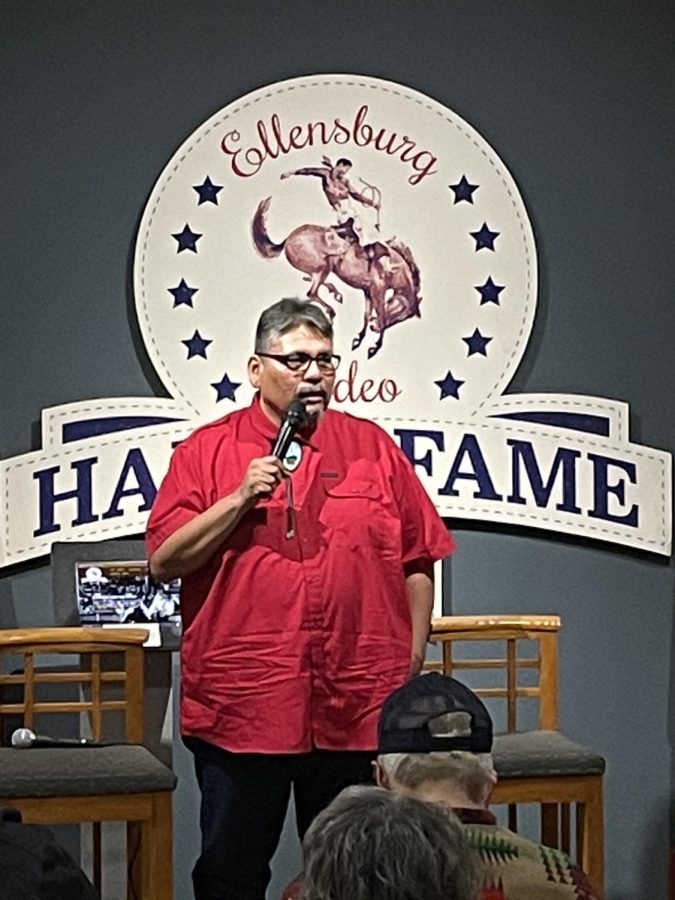Ellensburg celebrates Native American contributions to the rodeo
March 1, 2023
Members of local tribes took to the stage in the Rodeo Hall of Fame on Pearl St. to recount stories dating back long before Ellensburg was what it is today. Stories of horses and riders.
The second installment of Rodeo Night at the Museum, Original Partners: the Ellensburg Rodeo and Native American contributions, celebrated the Native Americans and their role in the local rodeo.
To celebrate the local rodeo that takes place every Labor Day, the Rodeo Hall of Fame is hosting an eight week event to commemorate the occasion.
The hour-long honorary event occurs every week on the same day at the Rodeo Hall of Fame up until Aug. 23. The event is free to the public who can learn about the history of the event and hear personal stories from families and participants.
The event featured Native American speakers. One of the speakers was from the Yakama Nation, Davis Washines, also known as “Yellowash.”
“We’re known as ‘Salmon People’, but also ‘Horse People,” Washines said.
Washines told the in-depth origin of how they came to interact with horses so much while migrating from Colorado to Washington. He said he felt rodeos kept the spirit of interacting with horses alive.
Nate Radfil, one of the organizers of the rodeo, said rodeos are the old ways of life and a sport.
“It’s exciting and the guys are competing all night long,” Radfil said. “It heralds back to the way things used to be and there is a lot of individuality in it. There’s lots of guys on their own finding out how to make it their own. At the same time, there’s good camaraderie, as well. I think everyone should go to one.”
According to Radfil, he’s a “sucker for the saddle bronc and the bare bronc … the horses kick a little higher, a little bit more excited than the bulls … Or the wild cowbell is always a little crazy.”
Speakers included those who grew up around the events and came far and wide across Washington to visit Ellensburg, which the speakers said was a well-known and lead location for the yearly rodeos. Leroy Morningowl, member of the Yakama Nation, was one of such people who is familiar with the events.
“I grew up around rodeos all my life and my family has always participated,” Morningowl said. “We grew up on the Yakama reservation and it’s nice to be recognized here. As a contestant myself doing the wild horse races, I love everything about rodeos. The way you’re treated at the event is standup all around, and I think everyone should attend them.”
Patricia Cleraine said they had a deep and personal relationship with the competitions.
“My father and grandfather have both always participated in the rodeos, so it’s been a very interesting event for us. It pulls the community together,” Cleraine said.
According to the Board of Directors and seasoned riders who spoke, many rodeo participants have become famous in Ellensburg or come to the city to show off their skills.
Danna Hennin, member of the Ellensburg Hall of Fame board, shared what she liked most about the rodeo.
“I love the history of rodeos and bull riding in particular is one of my favorite attractions,” Hennin said. “The toughness and spirit of it is what makes me admire it most.”



Eric Mills • Mar 3, 2023 at 10:21 pm
Rodeo is condemned by nearly EVERY animal welfare organization in North America due to its inherent cruelty. Rodeo has little to do with ranching–it’s mostly hype. For the majority of the animals, the rodeo arena is merely a detour en route to the slaughterhouse.
Real working ranch hands never routinely rode bulls, rode bareback, wrestled steers, barrel raced, or practiced calf roping (terrified BABIES!) as a timed event. Nor did they put painful flank straps on the animals or work them over in the holding chutes with painful “hotshots,” kicks and slaps. Some “sport”! Indeed, rodeo is not a true “sport” at all. Rather, it’s a bogus, macho exercise in DOMINATION.
And the media needs to stop promoting this blatant cruelty. The great majority of rodeos don’t even require on-site veterinary care. The PRCA has done so only since 1996, after five animals died at the 1995 California Rodeo/Salinas. Even Cesar Chavez was an outspoken critic.
The United Kingdom (England, Scotland, Wales) outlawed rodeos back in 1934, followed by Germany and the Netherlands. Can the U.S. be far behind? Rodeo has had its brutal day and now–like those Confederate statues–belongs in the Dustbin of History. BOYCOTT ALL RODEOS, THEIR CORPORATE ADVERTISERS & SPONSORS. FOLLOW THE MONEY.